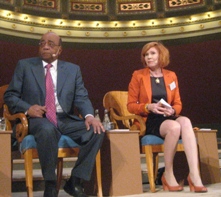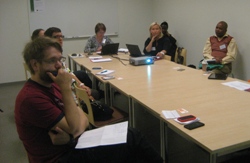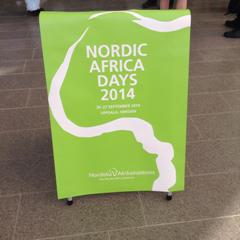Report on the Nordic Africa Days 2014: African Studies opening up?

The Nordic Africa Days were massive this year. A total of 250 researchers from more than thirty countries (many from Africa) took part in this conference hosted by the Nordic Africa Institute in Uppsala, Sweden, on 26-27 September. On Friday, honorary guest Mo Ibrahim held a keynote speech on the importance of good governance (and leaders!) in Africa.  On Saturday, Morten Jerven addressed the problem of ‘guesstimates’ instead of reliable statistical data in his keynote speech.
On Saturday, Morten Jerven addressed the problem of ‘guesstimates’ instead of reliable statistical data in his keynote speech.
 Jos Damen and Ursula Oberst from the African Studies Centre Leiden organized a panel entitled ‘Why Wikipedia and Open Access? The Valorization of African Studies in the 21st Century’. After an introduction by Jos Damen, presentations were given by Meri-Maija Marva (Satakunta University of Applied Sciences, Finland) on the MARIBIA-project and how to improve maritime education in Namibia on the level that can be approved by the International Maritime Organization, and by Ursula Oberst on the valorization of research at the African Studies Centre in Leiden.
Jos Damen and Ursula Oberst from the African Studies Centre Leiden organized a panel entitled ‘Why Wikipedia and Open Access? The Valorization of African Studies in the 21st Century’. After an introduction by Jos Damen, presentations were given by Meri-Maija Marva (Satakunta University of Applied Sciences, Finland) on the MARIBIA-project and how to improve maritime education in Namibia on the level that can be approved by the International Maritime Organization, and by Ursula Oberst on the valorization of research at the African Studies Centre in Leiden.
Ursula Oberst’s presentation sketched the many ways in which the ASC in Leiden is making its knowledge accessible and relevant for societal utilization. It presented the products and services developed for the valorization of ASC research, considered the way they are set up and maintained, and critically reviewed their successes and failures. Among the products and services discussed were two ASC publication series intended for the general public (thematic maps and info sheets), Wikipedia articles, regular columns in a Dutch development magazine and the ASC's open access publications.

Jos Damen addressed the possibilities for researchers to gain more readers for their publications. He sketched historical parallelism (journals in 1650 as a new way of communicating then), but also pointed to possibilities in the new era, with blogs, abstracts, open access journals, repositories and the like. He gave several tips to researchers to enhance their visibility.
The panel had a lively discussion afterwards, in which was spoken about the importance of free access from Africa to scientific output (see ilissAfrica) and the importance of target groups when making info sheets, thematic maps etc. One of the participants of the panel immediately tweeted these messages to her > 4,000 followers (https://twitter.com/kajsaha), partly in Ghana, which was a nice example of how to spread the word.
Ursula Oberst & Jos Damen, October 2014
Top photo: Mo Ibrahim and Iina Soiri, director of the Nordic Africa Institute, in the Grand Auditiorium, Uppsala University
Photo right: Morten Jerven
Photo left: Panel discussion
(All photos Jos Damen)

